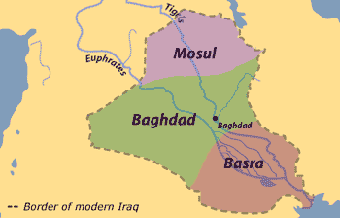
In David S. Broder's column this morning, he lays out a plan devised by Senator Joe Biden and Leslie Gelb, president emeritus of the Council on Foreign Relations to settle the situation in Iraq.
Their plan shows that they have some knowledge of the present situation in Iraq, unlike the present administration.
Their plan, in short, would let Iraq divide into "regional groups", while retaining a central government with control over defense, foreign policy and oil resources. While this plan is not perfect, it is infinitely preferable to Bush's "staying the course".
Biden, the senior Democrat on the Senate Foreign Relations Committee, is a
supporter of the war who -- like John McCain -- has been a consistent critic of
the administration's military strategy and diplomacy. This week, after his sixth
trip to the war zone, he said that the threat of sectarian violence -- an
incipient civil war between Shiites and Sunnis -- has become so great that the
United States must redefine its political goals in Iraq. Instead of betting
everything on the creation of a unified government in Baghdad, Biden said, we
should encourage the development of separate but linked regional authorities in
northern Iraq for the Kurds, in southern Iraq for the Shiites and in central
Iraq for the Sunnis.
The current constitution gives the 18 provinces of
Iraq the right to form regional groups. Biden would retain control of defense,
foreign policy and oil resources for the central government now on the way to
formation, but he would let the regional governments largely run their own
affairs.
This is, he told me, not a call for partition. It is a
recognition of what he considers a reality -- that the component parts of Iraqi
society need "breathing space" to adjust their relations, rather than continue
down the present road, where militias loyal to one side or the other are engaged
in wanton killing and ethnic cleansing.
It is this violence that poses
the main threat to Iraq's security now and that makes it impossible for the
American forces to set a departure date.
Biden's view is that Sunnis
will continue to support the insurgency rather than accept a unified government
in which Shiites dominate and in which oil revenue is monopolized by the Kurds
in the north and the Shiites in the south. Give them a territory of their own,
in the center, and guarantee them a share -- say 20 percent -- of the national
oil revenue, and they will consider themselves well rewarded.
The
Shiites in turn would know that they would continue their leading role in the
national government but would not face a virulent insurgency supported by
Sunnis. And the Kurds, who clearly want as much autonomy as they can get, would
be willing to grant a similar degree of self-government to the Sunnis and the
Shiites.
Under those circumstances, Biden argues, the rival militias
would stay home -- or safely disband. And under those conditions, the United
States could realistically announce its intention to withdraw the bulk of its
military by 2008, leaving only a residual "over-the-horizon" force to see that
the political agreement is kept.
While this is an excellent idea, I think it will be more of a first step, rather than a long term solution.
Given the history of the region, and they have long memories in this part of the world, I don't think that either the Kurds or the Sunnis will accept a central Shiite dominated government for a very long period of time.
The
foundation of Iraq
By the end of World War One, British forces were
more or less in control of the three provinces and a shaky British
administration in Baghdad had to decide on their future. The Ottoman Empire had
collapsed, leaving the former Arab provinces in limbo, and the colonial powers
of Britain and France aimed to absorb them into their empires; however, the Arab
and other inhabitants felt strongly that they had been promised independence.
Iraq (the old Arabic name for part of the region) was to become a
British mandate, carved out of the three former Ottoman provinces.
The
mandate united the three disparate provinces under the imported Hashimite King
Faisal, from the Hijaz region of Arabia. Apart from its natural geographical
differences, the new Iraq was a complex mix of ethnic and religious groups. In
particular the rebellious Kurds in the north had little wish to be ruled from
Baghdad, while in the south the tribesmen and Shi's had a similar abhorrence of
central control. In implementing their mandate, the British had certainly sown
the seeds of future unrest.
And now, almost 90 years later, George Bush and his neo-con advisors have plunged us neck deep in this mess.
Ideally, if we can implement the Gelb/Biden plan, we can start to extricate the United States from this sad situation that we have brought upon ourselves.
Ultimately, I believe that Iraq will have to separate into three autonomous nations. It won't be an easy process and it will require much cooperation by the UN and the world community. Whatever it takes to achieve peace and stability will be worth the effort. Occupation by American forces will never reach those goals.


No comments:
Post a Comment
I did not mean that Conservatives are generally stupid; I meant, that stupid persons are generally Conservative. I believe that to be so obvious and undeniable a fact that I hardly think any hon. Gentleman will question it.
John Stuart Mill (May 20 1806 – May 8 1873)